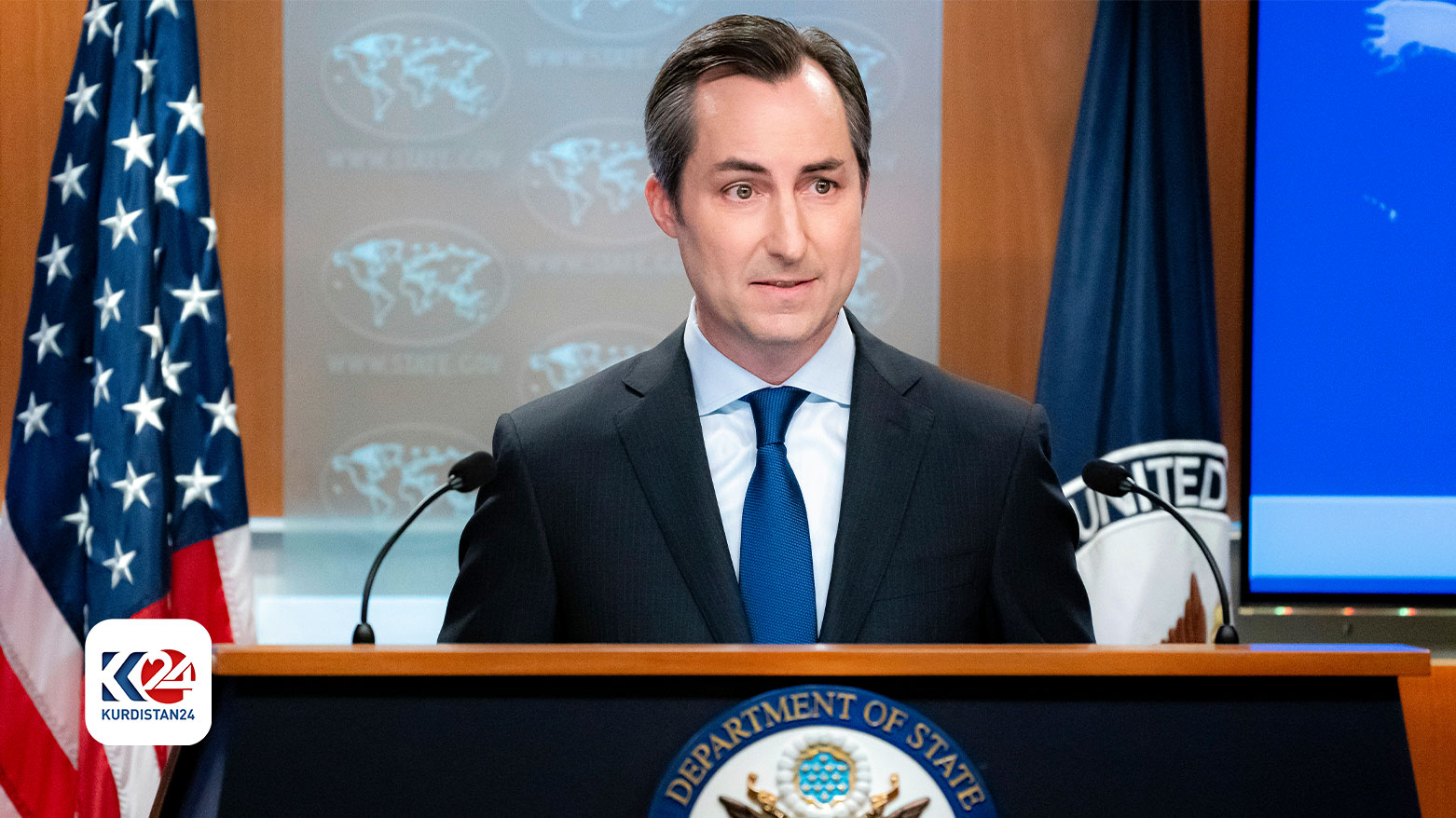US, Europe Call for De-escalation in Syria; Implementation of UNSCR 2254
Miller stressed the need for “a Syrian-led process under the auspices of UN Security Council Resolution 2254 to determine the appropriate path forward for the Syrian Government.”

Dec. 3, 2024
WASHINGTON DC, United States (Kurdistan 24) The U.S. and its European allies have called for “de-escalation” of the conflict in Syria and the implementation of U.N. Security Council Resolution 2254, which was approved nine years ago—in December 2015, four years into the Syrian civil war, triggered by the so-called “Arab Spring.”
That conflict re-erupted suddenly on Friday, with a surprise offensive of the armed Syrian opposition, led by Hayat Tahrir al-Sham (HTS) that captured Aleppo, Syria’s second-largest city.
HTS long controlled Syria’s northwest Idlib province, which borders Turkey and which is supplied from Turkey. However, HTS’s writ did not extend beyond Idlib.
The sudden success of the HTS-led offensive appears to have taken many parties by surprise, including the U.S. and its European allies, as well as Syria and its allies, Russia and Iran.
The Syrian opposition, dominated by Sunni jihadis, appeared to be strengthened relative to the Syrian regime, because of the weakness of Iran and the militias it backs.
That weakness is the product of their war with Israel, which began over a year ago, on Oct. 7, 2023, with Hamas’s cross-border attack into Israel, which killed over 1,110 Israelis, while kidnapping another 250.
It was a very brutal attack and Israel has responded with an unusual brutality, which has hurt Iran and its proxies.
Last week, Israel and Hizbollah reached a ceasefire after a year of fighting. Hizbollah tried to portray that as a victory. However, the success of the Sunni offensive—and the Sunni militants are vehemently opposed to Iran and its Shi’ite militia allies—has exposed that claim as a blatant falsehood.
US Secretary of State Speaks with Turkish Foreign Minister
Particularly as the success of the opposition offensive was a big surprise, the U.S. seems to have no clear policy toward the renewed violence. But in any case, it would be a difficult situation, as both sides are anathema to Washington.
It is fine to call for a political process in Syria to end the conflict, as the U.S. has done, but how will that program be implemented? Particularly as the basis for that call—UNSCR 2254—is so old?
One of the first U.S. actions was to consult with Turkey. Secretary of State Antony Blinken spoke with his Turkish counterpart, Hakan Fidan, on Sunday.
Minimally, Turkey gave the okay for the militias’ assault further south into Syria. But Turkey’s involvement may have been even greater. One target of the Syrian militias’ offensive has been Syria’s Kurds, and Ankara has long expressed strong criticism of the U.S. alliance with them in order to fight ISIS.
According to the read-out of the discussion between Blinken and Fidan, issued by State Department Spokesperson Matthew Miller, they “discussed the need for de-escalation and the protection of civilian lives and infrastructure in Aleppo and elsewhere.”
“They also discussed ongoing humanitarian efforts in Gaza and the need to bring the war to an end and secure the release of all hostages,” it added.
U.S. and European Joint Statement
Also on Sunday, the U.S., France, Germany, and Britain issued a joint statement with a similar message.
“We are closely monitoring developments in Syria and urge de-escalation by all parties and the protection of civilians and infrastructure to prevent further displacement and disruption of humanitarian access,” the statement of the four Western powers said.
“The current escalation only underscores the urgent need for a Syrian-led political solution to the conflict, in line with UNSCR 2254,” it concluded.
State Department Position
The renewed Syrian conflict featured prominently in Monday’s State Department briefing. Not surprisingly, the Spokesperson, Matthew Miller, essentially repeated the established U.S. position.
Miller consistently stressed the need for “a Syrian-led process under the auspices of UN Security Council Resolution 2254 to determine the appropriate path forward for the Syrian Government.”
That was Miller’s response to a question as to whether the Biden administration agreed with its predecessor’s policy that Assad’s rule should end: it was up to the Syrian people, as determined in a Syrian-led political process, Miller said.
He also denounced HTS as a “terrorist organization,” affirming “We certainly do not support that organization in any way, shape, or form.”
Indeed, Tehran claims that the U.S. and Israel are behind HTS, and Miller noted that such reports could be seen “floating around on social media.” However, “that could not be further from the truth,” he stated. “It is false in every way, shape, or form.”
ISIS and HTS are not the Same
Miller also affirmed an ongoing U.S. commitment to ensuring the continued defeat of ISIS. However, he would not expand that to committing U.S. forces to a fight against HTS.
Indeed, Americans have grown weary of the “forever wars” in the Middle East. That was one factor contributing to Donald Trump’s re-election, and the Biden administration is unwilling, in its last weeks in office, to expand the U.S. military commitment in the region.
“The United States has engaged a coalition in Syria and Iraq to fight the growth of ISIS,” Miller explained, “and we continue to support that work to fight the growth of ISIS, to keep ISIS from re-emerging as a terrorist threat.”
Then when asked, however, if U.S. forces deployed in the region, where they are fighting ISIS—just as Miller had explained—might take action against HTS, his answer was negative.